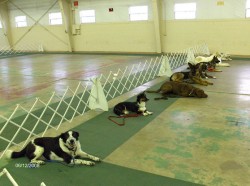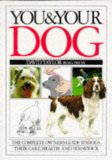A training tip that bears repeating
 Here is something I said recently to my class at my local dog training club and I think bears repeating here:
Here is something I said recently to my class at my local dog training club and I think bears repeating here:
When you are training your dog, work with your dog where she or he IS not where you think she or he should be. This is the number one rule in dog training: train the dog you have, not the one you wish you had. Also, if your dog shows any behavior that is particularly difficult for you (jumping, aggression, not listening, barking) realize that for the dog it is simply a behavior – for you it is a whole story about how the dog is “bad” or “mean” or “doesn’t like me” or “doesn’t listen”. Treat the behavior as a behavior and it will be easier to manage. Every behavior works under the same set or principles: Behaviors that are rewarded continue, behaviors that are ignored or “corrected’ go away. But sometimes we are rewarding behaviors when we think we are not, and some behaviors (like barking) are self rewarding, so be careful to really look at what is going on…and this is where the help of a trainer comes in handy as they can see things we can’t when we are right up in something. Never hesitate to ask a question or to seek advice. We’ve all been there!
Good Books and What They Don’t Say
I love my books. I have used two to help me understand what things to expect as I work with my foster mamas. Neither of these books are the definitive, must-have reads that some of my books are to me. But they are sound books with good advice and they are books I happened to have around or were able to find on a quick run to the bookstore. They are:
 |
 |
However, there are some things that they don’t tell you in books:
• Mama dogs have loose stools, like soft serve ice cream (sorry, sort of gross) especially if you’re feeding them a rich diet. Expect this and don’t assume there is anything wrong unless it is clear that the mama is lethargic or unwell, or if the poop stinks to the high heavens of if there is blood in the stool. All of these are signs of illness (likely parasites) and need to be addressed by the vet. A good rule of thumb is to get a stool sample tested by the vet right when the mama arrives and another a few weeks later. Don’t assume a clear sample is really clear. Some of these parasites take awhile to show up. And don’t assume that you can’t catch what the mama has. Many parasites are transmittable to humans. Something I learned all too well over the summer when I caught giardia from Sweetie. The treatment was effective and I’m fine now but the medication was so strong it literally took me months to feel normal in my gut again.
(more…)
What You Need for a Mama Dog
Planning on fostering a pregnant Mama dog? Here’s a list of what you might need:
* A few good resources on how to whelp puppies.
* A secluded room away from family commotion and other animals.
* A door that closes and nothing in it that you would mind getting ruined – including the door and walls.
* A floor that is easily cleaned with a bleach solution.
* A space heater that you can leave on all day and all night without fear of fires. Not one of those kinds that blows hot air. We have an oil one. You could also use a heat lamp. You need to keep the room at 85 degrees Fahrenheit for the first two weeks of the pups’ lives. They can’t control their own body temperature on their own until 4 weeks of age.
* An area for whelping, nursing, and eating, and a space far enough away from those for elimination (for those stray Mamas who weren’t house trained.)
* A plastic or wood “box” with sides high enough so little young pups can’t crawl out but older, bigger ones can. We use a small turtle sandbox – it is perfect. I’ve also heard of people using plastic swimming pools. With Bella I build a box that was too big and she hated it. Never used it.
(more…)




